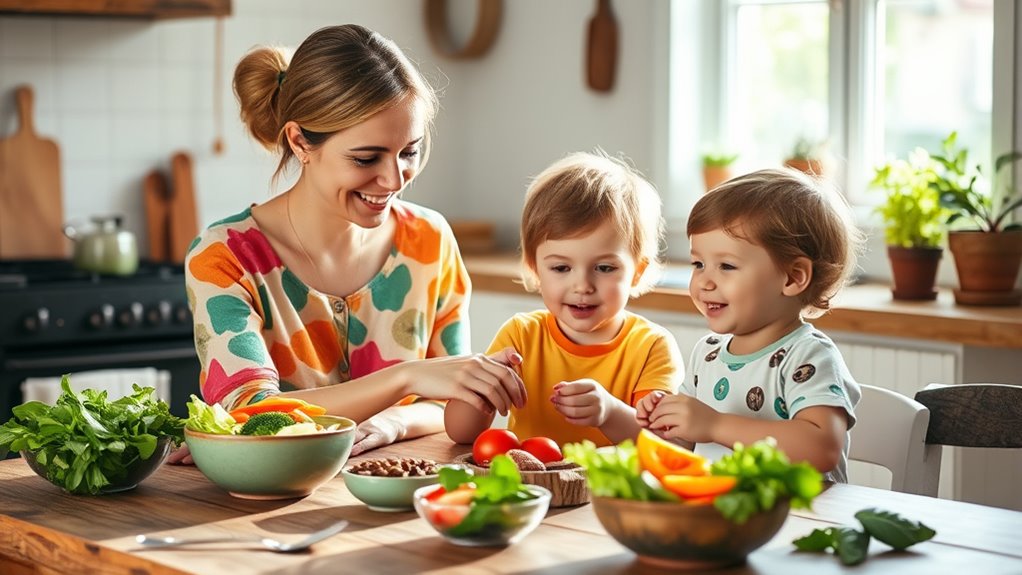To raise kids with compassionate values through vegan parenting, focus on teaching respect for animals, caring for the environment, and making ethical food choices. Involve your children in meal planning and preparation to foster understanding and mindfulness. Use engaging stories and activities to explain nutrition and the benefits of plant-based eating. By nurturing their curiosity and compassion early on, you create a positive, health-conscious lifestyle that aligns with your values—there’s much more to explore beyond this!
Key Takeaways
- Involve children in meal planning and preparation to teach compassion, respect, and ethical food choices.
- Use engaging stories, visuals, and hands-on activities to educate kids about plant-based nutrition and its benefits.
- Foster understanding of ethical values by explaining the reasons for veganism and its impact on animals and the environment.
- Promote a diverse, colorful diet rich in fruits, vegetables, grains, nuts, and seeds to support healthy growth and ethical eating.
- Encourage positive attitudes toward vegan meals by making them delicious, satisfying, and aligned with children’s tastes and preferences.

Have you ever wondered how to raise children on a vegan diet while guaranteeing they get all the nutrients they need? It’s a common concern, but with thoughtful planning and a clear understanding of plant-based education, you can confidently guide your kids toward a compassionate and healthy lifestyle. The key starts with fostering a deep understanding of why you choose a vegan way of living, and this naturally ties into ethical meal planning. When you involve your children in choosing and preparing meals, you teach them about compassion for animals, respect for the environment, and the importance of health. This kind of ethical meal planning helps your kids see food as more than just sustenance; it becomes a way to live out their values.
To do this effectively, you need to prioritize education that’s age-appropriate and engaging. Plant-based education isn’t just about telling your children what they shouldn’t eat; it’s about inspiring curiosity and understanding. Show them how plant foods provide all the necessary nutrients, including protein, iron, calcium, and vitamin B12, through colorful fruits, vegetables, grains, beans, nuts, and seeds. Use visuals, stories, and hands-on activities to make learning about nutrition fun and meaningful. When children see how delicious and satisfying vegan meals can be, they’re more likely to embrace their lifestyle with enthusiasm. Incorporating nutritional diversity into their diet ensures they receive a broad spectrum of nutrients essential for growth.
Ethical meal planning also involves making meals that are nourishing, balanced, and appealing. You want your children to develop healthy eating habits without feeling deprived. Incorporate their favorite flavors and textures into vegan dishes, and involve them in shopping and cooking. This participation creates a sense of ownership and helps them understand the importance of making mindful choices. It’s also crucial to ensure variety in their diet, so they receive a broad spectrum of nutrients. Regularly consulting with a pediatric nutritionist can give you peace of mind and help tailor meal plans suited to your child’s evolving needs.
Frequently Asked Questions
How Do Vegan Parents Handle Peer Pressure on Their Kids?
You handle peer pressure on your kids by fostering open conversations about social acceptance and peer influence. You teach them to stand firm in their values while respecting others’ choices. Encouraging confidence and providing supportive environments helps your children navigate social situations without feeling isolated. You also model respectful behavior yourself, showing that compassion and understanding can bridge differences, making it easier for your kids to stay true to their vegan lifestyle amid peer pressure.
Are There Specific Challenges for Vegan Toddlers in Nutrition?
You might worry about nutritional deficiencies in vegan toddlers, but with careful meal planning, you can guarantee they get essential nutrients like vitamin B12, iron, and calcium. Focus on offering a variety of plant-based foods and fortified products. Regular check-ups help catch any deficiencies early. By staying proactive and informed, you’ll support your toddler’s growth and health while sticking to your compassionate values.
How Can Vegan Families Introduce Non-Vegan Friends to Their Lifestyle?
You can start by sharing your positive experiences with plant-based outreach, showing how it benefits your family. When introducing non-vegan friends to your lifestyle, use compassionate communication, emphasizing kindness and shared values. Coincidences often lead to meaningful conversations—like a dinner or outing—where you naturally discuss your vegan choices. This relaxed approach helps friends feel curious rather than judged, making the progression smoother and fostering understanding.
What Are Effective Ways to Teach Compassion Through Vegan Parenting?
You can teach compassion through vegan parenting by emphasizing animal rights in everyday conversations. Use ethical storytelling to illustrate how kindness impacts animals, fostering empathy in your kids. Encourage them to contemplate animals’ feelings and rights, making these concepts relatable. Show compassion through your actions, like volunteering or making kind food choices, so they learn that caring for others is a core value. This approach nurtures a compassionate, ethical mindset from a young age.
How Do Vegan Parents Manage Travel and Dining Out With Kids?
When you travel or dine out with your kids, pack travel snacks that align with your vegan values to avoid last-minute options. Research restaurants beforehand, focusing on places with vegan menus or flexible options. Teach your kids dining etiquette that respects the staff and other diners. This way, you make outings smoother, guarantee your family stays true to your compassionate lifestyle, and turn every meal into a teachable moment.
Conclusion
As you raise your kids with compassionate values, remember that like a small seed growing into a mighty tree, your efforts plant kindness and awareness that can blossom into a more compassionate world. I once met a parent whose child refused to eat meat after learning about animals’ lives, illustrating how your gentle guidance can shape a future rooted in empathy. Keep nurturing those values—you’re cultivating a generation that will grow with love and respect for all living beings.










